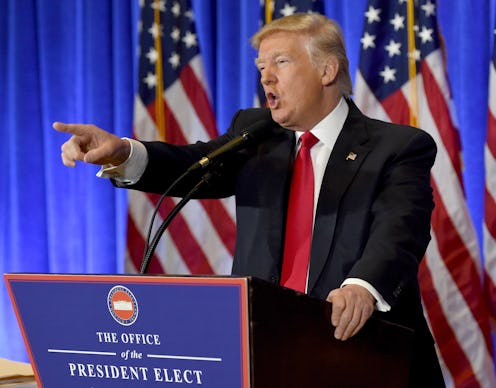
Today during his first press conference since July, Donald Trump refused to call on Jim Acosta, a Senior White House Correspondent for CNN. Though the President-elect is by no means obligated to answer each and every question presented to him, his treatment of the reporter prompts concerns about freedom of press in the upcoming four years.
Instead of allowing Acosta to pose his question, Trump repeatedly shut him down and accused CNN of reporting "fake news." Later that same evening, Trump's incoming Press Secretary Sean Spicer suggested in a tweet that Acosta owes Trump an apology, deeming his behavior "rude, inappropriate and disrespectful."
Prior to Acosta's attempt to ask Trump a question, the President-elect had admonished CNN for publishing a breaking news report claiming that both President Obama and the President-elect had been briefed by U.S. intelligence officials that Russia allegedly possessed potentially damaging personal and financial information about Trump. Trump vehemently denied the report's allegations, and Russia itself denied having any "compromising" material on Trump. Since Trump had directly called out the network for reporting on the matter, Acosta believed that CNN should be allowed the opportunity to ask him a question in return.
Blatantly accusing a network of reporting "fake news" that it (in actuality) painstakingly vetted and then denying them the opportunity to confront this accusation via question or comment sets a dangerous precedent. A President-elect cavalierly accusing a respected news network of publishing fake information is egregious itself, let alone trying to suppress a reporter's questioning of this accusation in the same forum.
The exchange between Acosta and Trump felt very uncomfortable to me, evoking disquieting feelings of an elected official deciding what does and does not constitute facts and news. Moreover, he essentially ostracized members of the press with whom he does not agree or does not believe cover him favorably.
In summary, the tone set by Trump's first press conference as President-elect is concerning. If this "us versus them" mentality towards the press continues, it could risk putting the United States on a dangerous and slippery slope toward limiting press freedom.
A free press is one the cornerstones of a democracy, and all administrations, regardless of party or personal feelings, should ensure that press freedom is absolutely protected and respected. On top of that, our nation's officials should not engage in any activities which appear to compromise this freedom. It would serve the Trump administration well to be very cognizant of this fact and provide journalists with the respect, access, and credibility that they rightfully deserve.